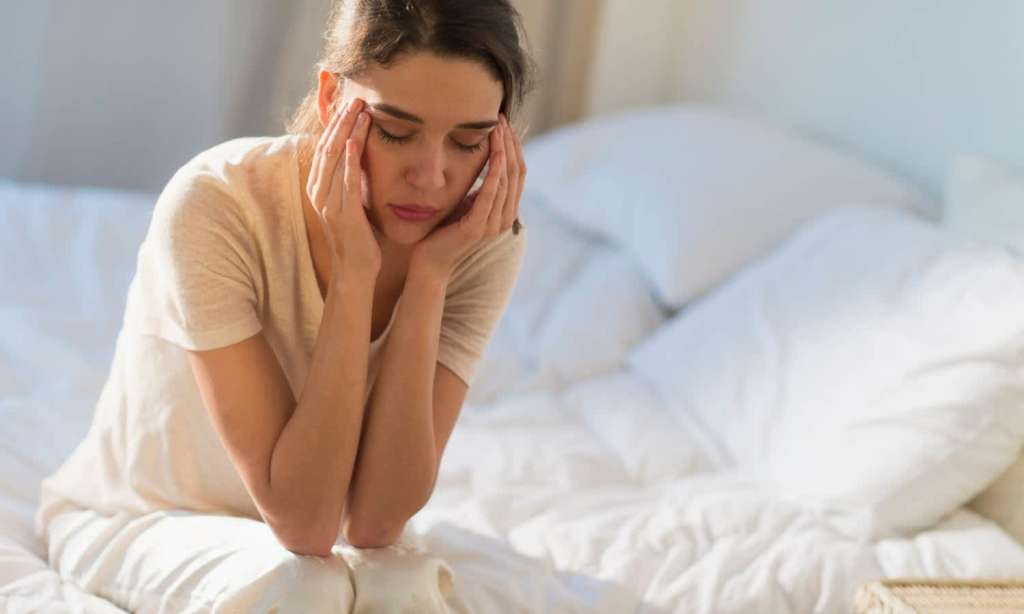Staying on top of our physical and mental health during lockdown is no joke. For Sydneysiders, our bodies and minds have never been through this situation before — a second lockdown, that is — and so it’s incredibly important that we pay attention to them.
“Lockdowns have thrust Aussies into an abnormal environment,” says Dr Andrew Thompson, a registered doctor at InstantScripts, an online service providing alternative primary healthcare options to those who have difficulty accessing a doctor due to cost, location or residency status.
“As a result, we might see a manifestation of physical and mental health symptoms that might not appear under normal circumstances. It’s important not to be alarmed by this. Many symptoms are common, temporary and can often be addressed through adjustments.”
Ahead, he shares just what those symptoms are and what you can do about them.
Chronic tiredness or insomnia
We actually already covered why you’re so tired all the time in detail (in short, our brains simply can’t cope with staying in the same place), but Dr Thompson simplifies the reason as being mental strain. “As your heart rate increases, you become more alert while trying to adapt to a new normal, eventually reducing energy over the course of the day.
To manage these symptoms, he says focus on sleep hygiene, including maintaining regular sleep and wake times and limiting screen time before bed, he says.
Studies have also shown meditation can help people fall asleep faster. “I couple it with breathwork for extra potency,” says Vicki Smart, a yoga teacher at BodyMindLife Online. “Also, it’s not only about clearing your mind. You can use distractions as assistants if you flip your viewpoint. Visualise a post-it note saying ‘thought’ being stuck to thoughts as they arise. Use that as your focal point.”
Headaches
Next up, headaches. While of course stress caused by your lockdown situation can play a role in causing them, Dr Thompson makes note of two other factors you might not have considered. “When at home, you are more likely to increase your screen use and, without an ergonomic remote working set-up, neck and shoulder pain can progress to headaches.”
The good news is that headaches can be often managed by making simple lifestyle changes, Dr Thompson says. He suggests taking a break from the screen and getting outside for fresh air, exercise and sunlight, when possible, as well as making sure you’re getting enough sleep and staying hydrated.
Anxiety or depression
If you have or are experiencing anxiety and depression only during lockdown, know that it’s likely related to a change in your environment, routine or circumstances. If that’s the case, it’s known as an adjustment disorder, whereby a person who doesn’t have a mental health disorder suddenly develops symptoms associated with it, explains Dr Thompson.
Again, like all the symptoms on this list, know that it’s temporary and manageable with help.
“In some cases, you may require short-term medication,” says Dr Thompson. You might also consider talking to a psychologist or medical professional — noting that the latter are not trained psychologists but that talking to one and getting things off your chest may be helpful.
If you’d prefer not to take any medication, it’s worth looking into meditation as it can change the brain’s structure and how it responds to stress. “Meditation doesn’t have to be seated in perfect lotus pose,” Smart says. “Try a walking meditation next time you’re out getting some sun. Watch the trees, feel the wind on your face, bask in the now.”
Weight gain
Another common symptom of lockdown is weight gain. In fact, a recent study found a third of Australians had gained weight during the pandemic. Dr Thompson says this is a result of having 24-hour access to our fridges and pantries and being naturally less active. However, if you have gained more than 5kg in a short period, he does recommend some lifestyle changes.
“It’s important to stay active, and while you may feel less motivated during this time, I encourage you to push yourself to exercise, even if it’s a walk around the block,” he says. “Try and be stricter with your diet as well. Your routine may be out of balance so it’s important to maintain the routines you had pre-lockdown. Also, if you used to limit your snacking or if you meal-prepped for the week, try to bring this back.”
Thoughts of self-harm or suicidal ideation
If you’re contemplating self-harm or experience suicidal thoughts, Dr Thompson says it’s important to know there’s always a medical professional at the end of the phone who can help.
“I strongly encourage you to seek medical attention as soon as possible,” he says. “Speaking to a GP is a good first step. A doctor will encourage you to have a support network set up, such as family or friends, that you can call upon when you feel you aren’t coping, and might also suggest medical therapies.”
A doctor might also suggest medical therapies or refer you to a specialised medical professional.
If you or anyone you know is struggling and needs support, call Kids Helpline on 1800 55 1800 or Lifeline on 13 11 14, both of which provide trained counsellors you can talk with 24/7. You can also speak with someone confidentially at Headspace by calling 1800 650 890 or chat online here. If you are in immediate danger, call 000.
Read more stories from The Latch and subscribe to our email newsletter.

